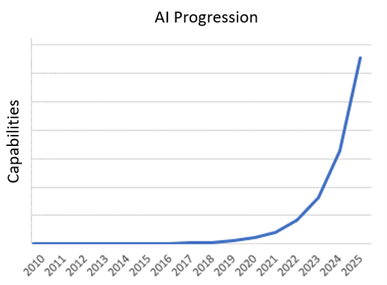I have to fess up. I ‘borrowed’ the title from a great line uttered by Jennefer Mueller, President and Chair of AHIMA, in a great interview I watched embedded in this HealthCare IT Today article authored by Colin Hung: From Paper to Pixels: The Future is Bright for Health Information Management
I’d recommend reading the article and watching the video. In the article and video, the topics were centered on ideas near and dear to my heart:
Leaving paper, including e-paper (efaxes, emails and scans), behind
HIM’s transition from a paper medical document repository to a dynamic, data-focused department, positioned as a source of information and direction
Artificial Intelligence (AI)
I’m going to spend some time on the third item, AI.
In the ‘olden days’ AI used to only be the theme / idea of sci-fi books and movies. In the iconic film “2001: A Space Odyssey,” released in 1968, Hal, a sentient computer, brought the positive and negative elements of AI to the forefront. In another AI-based Sci-Fi move, “The Matrix” released in 1999, we saw how Neo, Trinity, and Morphius battled the sentient “Machines.”
These movies are now 55 and 24 years old, respectively. Even 15 to 20 years ago, the reality is that AI was only starting to develop. For anyone outside of the tech centers of Silicon Valley and Cambridge, the topic of AI was still, largely, only a near fictional one; brought up only occasionally, mostly in a philosophical and or prophetic context.
Fast forward to 2023. We all know that AI is consuming a great deal of our thought processes today. AI is on an assent in its development curve that indicates there is much more to come… and in short order. Saying that it’s been ‘20 minutes’ since we talked about AI is still a humorous line, though it is more appropriate now than it would have been even a year or two ago, let alone a decade or two ago.
So, where is AI going to lead us? I think like many of us, I can’t say with certainty all the places it will show up and what the impact will be. However, it is not surprisingly finding its way into healthcare, notably in the area of provider productivity.
AI is being utilized in multiple areas to improve productivity with the goal of reducing stress and subsequent burnout of healthcare providers. Noted areas of use include ambient listening, the automation of clinical notes and summaries, care coordination, clinical decision support, and patient facing portal summaries as well as chatting. All these applications are offloading work from the overburdened healthcare provider.
A great deal of innovation in healthcare’s use of AI is coming from EHR software providers. One of Epic’s 60 generative AI projects is creating tools to offload the provider responsibility of summarizing a patient’s new information since their last physician visit. The next project is to put into layman’s terms things like their health record so that they can better understand them. Their intention is to also use generative AI to translate the health record into different, patient appropriate, languages.
Oracle Health (formerly Cerner) also intends on automating administrative workflows. They are working on a digital assistant that is essentially the “Alexa” of the clinical area. A physician can ask questions about their schedule, ask for patient summaries, etc. Their tool can even provide next step suggestions as a consultative measure for the provider to consider.
Meditech is working on ways to streamline clinical documentation with a focus on hospital discharge summaries. Clearly aimed at streamlining the transition of care process, this is a notable effort in what is often a chaotic workflow. The AI will bring in the relevant discrete information to populate the discharge summary. The provider will need to review it and confirm it before it is released.
There are many issues associated with physician and nursing burnout where efficiency tools are desperately needed to take pressure off of their workload and release stress that has been building. These examples are just a few of the many notable efforts in the generative AI development space with many more under way.
Come back in 20 minutes and we can discuss a few more! 😊
About the Author: Norm Kruse
Norm is a Business Development Manager with experience in Healthcare and Telecommunications technologies. He earned his BS – Business Administration at Winona State University and his MBA – IT Concentration at the Carlson School of Business at the University of Minnesota. Technology applied to workflow design is a focused area of interest.


